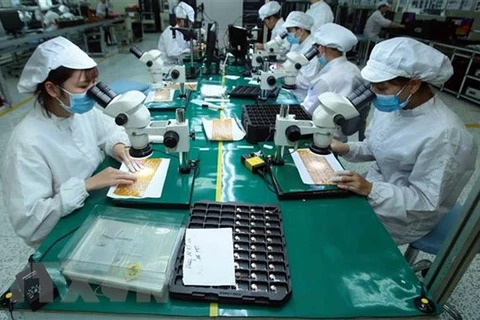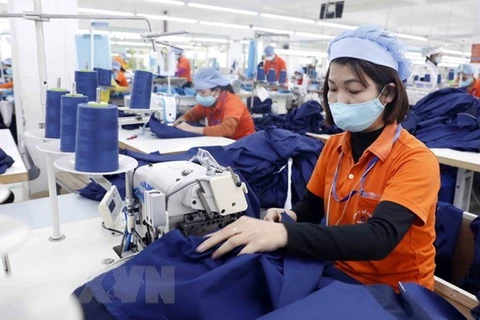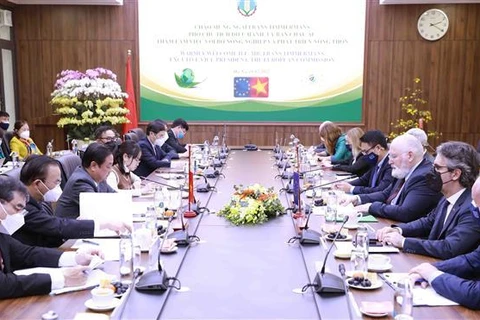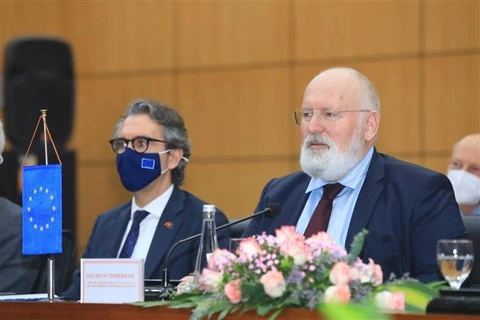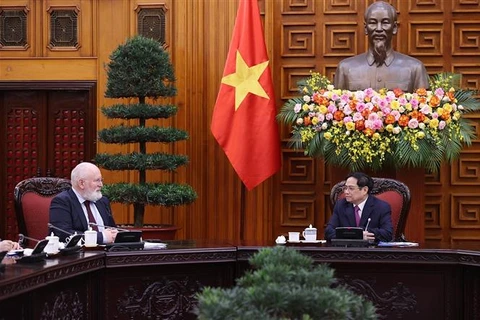Hanoi (VNA) – The implementation of the EU - Vietnam Free Trade Agreement (EVFTA) has greatly helped make up for a downturn in the economy caused by the COVID-19 pandemic, experts said at a workshop in Hanoi on February 25.
Nguyen Thi Thu Trang, Director of the Centre for WTO and International Trade at the Vietnam Chamber of Commerce and Industry (VCCI), said since the EVFTA took effect on August 1, 2020, trade between Vietnam and the EU has posted impressive growth.
Despite numerous pandemic-triggered difficulties, Vietnam’s exports to the EU still hit 40.06 billion USD and imports 16.89 billion USD last year, respectively rising 14.1 percent and 15.3 percent from 2020.
After more than one year of the EVFTA enforcement, more businesses have grasped and made use of preferential tariffs under this deal. From the date it came into force to the end of 2020, the EUR.1 certificate of origin was used for 2.35 billion USD in exports while 15.1 percent of the shipments to the EU benefited from preferential tariffs. The respective figures stood at 5.15 billion USD and 22.5 percent in the first seven months of 2021, Trang noted.
Dr Le Dang Doanh, an economic expert, described the EVFTA signing as a demonstration of Vietnam’s success in diversifying its external economic relations to avoid overdependence on a single market or a single source of supply and reduce risks for the economy.
The Vietnamese and EU economies are complementary to each other, so the EVFTA implementation benefits both sides, he said, elaborating that Vietnam can import the products it is unable to make from the EU, which in turn can import the commodities Vietnam has strength in such as apparel and agricultural products.
The agreement also helps facilitate institutional reform in Vietnam, he added.
Nguyen Thi Thu Trang, Director of the Centre for WTO and International Trade at the Vietnam Chamber of Commerce and Industry (VCCI), said since the EVFTA took effect on August 1, 2020, trade between Vietnam and the EU has posted impressive growth.
Despite numerous pandemic-triggered difficulties, Vietnam’s exports to the EU still hit 40.06 billion USD and imports 16.89 billion USD last year, respectively rising 14.1 percent and 15.3 percent from 2020.
After more than one year of the EVFTA enforcement, more businesses have grasped and made use of preferential tariffs under this deal. From the date it came into force to the end of 2020, the EUR.1 certificate of origin was used for 2.35 billion USD in exports while 15.1 percent of the shipments to the EU benefited from preferential tariffs. The respective figures stood at 5.15 billion USD and 22.5 percent in the first seven months of 2021, Trang noted.
Dr Le Dang Doanh, an economic expert, described the EVFTA signing as a demonstration of Vietnam’s success in diversifying its external economic relations to avoid overdependence on a single market or a single source of supply and reduce risks for the economy.
The Vietnamese and EU economies are complementary to each other, so the EVFTA implementation benefits both sides, he said, elaborating that Vietnam can import the products it is unable to make from the EU, which in turn can import the commodities Vietnam has strength in such as apparel and agricultural products.
The agreement also helps facilitate institutional reform in Vietnam, he added.
Trade experts held that amid the pandemic’s adverse impacts on the entire trade and investment activities in the world, including Vietnam, the EVFTA enforcement holds great significance as it helps compensate for a downturn in the economy, diversify market opportunities, and create momentum for post-pandemic growth.
This is also a chance for enterprises to engage in new supply chains replacing the traditional ones that are currently interrupted or stagnant due to COVID-19, they added.
However, they also pointed out that because of limited capacity, Vietnamese businesses still face certain problems in utilising preferential tariffs.
To further grasp opportunities, Trang underlined the need to improve domestic firms’ capacity, recommending enterprises be more proactive in all trading activities.
In addition, authorities also need to provide necessary assistance in terms of market information, trade promotion, and business climate improvement, she added./.
This is also a chance for enterprises to engage in new supply chains replacing the traditional ones that are currently interrupted or stagnant due to COVID-19, they added.
However, they also pointed out that because of limited capacity, Vietnamese businesses still face certain problems in utilising preferential tariffs.
To further grasp opportunities, Trang underlined the need to improve domestic firms’ capacity, recommending enterprises be more proactive in all trading activities.
In addition, authorities also need to provide necessary assistance in terms of market information, trade promotion, and business climate improvement, she added./.
VNA


